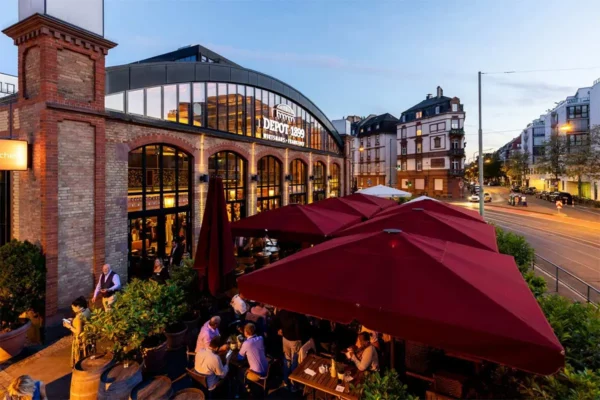(Pictured above L-R: Sean Anderson, IACC president, Mark Cooper, IACC CEO, and Alan Corlett, group commercial revenue director for U.K.-based De Vere)
Making a positive impact through running ethical meeting venue operations and adopting strong social practices will be the key area of focus for venues and planners by 2025 according to IACC’s annual Meeting Room of the Future report 2020.
The IACC, formerly known as the International Association of Convention Centers, is currently a global community of passionate people and companies delivering innovative and exceptional meeting experiences. Its report, which was conducted ahead of the COVID-19 pandemic, focuses on the 12 months leading up to February 2020. The report also includes forward predictions from IACC and survey respondents on how the meetings landscape and attendee behaviors may change in a post-COVID market.
The report reveals that 74 percent of meeting venue operators see corporate social responsibility and ethical operations as a top priority in the next 12 months (meeting planners placed this second highest in the 2019 report). Forward predictions suggest that the industry will have a greater understanding of the value and importance of social contributions, with venues ideally placed to showcase their excellent ethics and social contributions towards staff, attendees and local communities. The IACC Better Tomorrow social responsibility program aims to measure, promote and celebrate the contributions made by its 400 global member venues.
The report cites another major change, the growing number of millennials joining the global workforce. Currently millennials are the largest generation in the workforce and are leading the way for shaping future behaviors in professional settings. New trends that are emerging, such as comfortable lounge-like furniture, frequent refreshment breaks, networking spaces, are largely brought about by their specific needs and preferences. Yet, when venues were asked if they do anything to specifically address the behaviors and needs of millennials, only 41 percent said ‘yes,’ indicating that half of venues are not yet creating meeting environments that are conducive to the productivity of the largest generation in the workforce. While the operators surveyed have an average of 40 percent millennial staff, only an average of 18 percent of them are in leadership positions, able to influence key decisions and ensure they are delivering appropriately to millennial delegates.
Sean Anderson, IACC president and VP operations, Sodexo Conferencing, says, “Representing the top 1 percent of meeting venues worldwide, IACC members consistently demonstrate an ability to “see around corners,” to stay connected with industry professionals to help lead the journey forward. Even within the significant collective challenges of the COVID-19 virus, perhaps the most difficult period our industry has ever seen, this year’s report shows our members first and foremost placing others before self. The immense global benefits of true social responsibility, as well as a vision to recreate meeting spaces, food and beverage and technology.”
One of the reports contributors, Alan Corlett, group commercial revenue director for U.K.-based De Vere says, “There are new assurances for venue selection, hygiene, safety, social distancing measures, technology, catering operational standards that are being seen as important. It is not eroding past important elements, including caring for the environment, in planner’s proposal requests. This suggests more elements are important today in the interim first recovery phase for meetings.”
The report identified virtual reality is still a technology which many venues are yet to fully embrace, although this is changing with 76 percent of venues either offering virtual tours now or planning to in the next 12 months. Virtual site tours are becoming increasingly popular, eliminating the need for travel and providing an effective solution for those with tight schedule. IACC predicts that virtual reality and virtual site tours will be embraced by many more venues in the next 12 months as they look for alternative ways of marketing their spaces.
The “Meeting Room of the Future” report also revealed that experience creation is still high on the agenda for many venues and meeting planners as 69 percent of venues said they offer enhanced experiences on a budget, many through creating personalized and bespoke offerings for the client that fit with their specified budget rather than from a “price list.” As the meetings industry begins its recovery following the pandemic, it is expected that more planners will look to host elements of meetings and events outdoors.
Dietary requirements have continued to remain the number one priority in food and beverage for venue operators in 2020. Of those surveyed, 95 percent said they had witnessed an increase in the number of requests to accommodate dietary requirements and are using locally-sourced food and beverage items whenever possible while 92 percent of venues believe it is important to promote healthy eating and active living, which is reflected in their food and beverage offering.
IACC CEO Mark Cooper says, “As an industry we are all going through an unfathomable and uncertain time. The effect that COVID-19 has had on the meetings industry has been severe and we may see a dramatic change in the way we meet in future. I firmly believe that IACC venues being smaller group venues, with large meeting spaces and large open plan social areas, will be well placed to welcome returning meetings, training courses and smaller conferences in the coming months,” adding that the “IACC is committed to educating our industry and providing facts and figures which will help businesses adapt and ensure their offerings are future-proof.”
IACC’s “Meeting Room of the Future” report brings together insights from more than 50 venues from three different continents. The profile of venues surveyed include a high number of IACC-certified venues, where meetings, conferences and training represent between 50-100 percent of their business mix. A separate survey was conducted on venue suppliers, these include global meeting space designers, architects, technology companies, nutritionists and furniture manufacturers.
To download the full report visit the IACC Meeting Room of the Future website.
Founded in 1981, IACC is dedicated to representing the best meeting venues globally and is, by definition, the future of the meetings industry realized. The association brings together the brightest, most innovative minds from around the globe. IACC elevates the meeting experience by creating a unique point of entry that is inclusive of the best-in-class meeting venues internationally. IACC membership is a symbol of meeting excellence and exceptional connections amongst the best in the meeting industry. This exclusiveness makes IACC’s members part of an elite group representing the most innovative, forward-thinking and results-driven meeting venues globally. All members meet a set of stringent quality standards and agree to a code of ethics. IACC includes more than 400 member conference venues from Australia, Hong Kong, Japan, New Zealand, Philippines, Russia, Singapore, Malaysia, Belgium, Denmark, England, France, Germany, Hungary, Italy, Netherlands, Scotland, Spain, Sweden, Switzerland, Ukraine, Wales, Canada, Costa Rica, Mexico and the U.S. The IACC mission statement: “To bring together the brightest industry minds to promote the best meeting venues, which deliver exceptional meeting experiences. There are meetings… And then there are IACC meetings.” The IACC Vision: “IACC is a global community of passionate people and organizations delivering innovative and exceptional meeting experiences. For more info, visit http://www.iacconline.org/






























